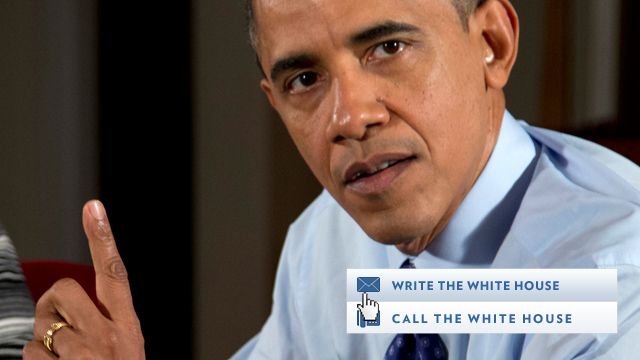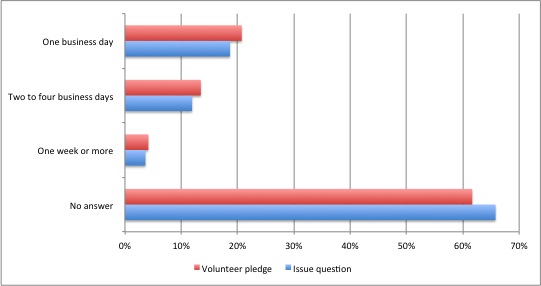
It sounds like the setup to a joke: How do you get a politician’s attention?
But it’s a question worth asking. The Internet has made it easier for constituents to send messages to the politicians who represent them — messages to Congress quadrupled between 1995 and 2004 — but it’s less certain that anyone is actually reading those messages.
Between 2007 and 2010, University of Bologna and NYU-Florence political scientist Christian Vaccari sent emails to 142 political parties and presidential candidates in seven western democracies, including the U.S., to gauge how each responded. He sent two emails to each party and candidate: One asked for the party or candidate’s position on taxes, the other asked for information about how to get involved as a volunteer.
At a conference on digital-era campaigning in London last month, Vaccari reported that only one in five of his emails received a reply within one business day; the majority of the emails, almost two-thirds, went unanswered. Vaccari found that, in general, parties tended to respond more often than individual candidates, and progressive parties tended to respond more often than conservative parties.
Vaccari also found that, overall, U.S. parties and candidates responded less often than in the six other western democracies he looked at: Australia, France, Germany, Italy, Spain and the U.K.
Where do the emails go?
Shayna Englin is a political advocacy and communications consultant — she researches what she calls “The Advocacy Gap.” Englin says many emails may not be read right away, or, possibly, at all. Staffers may be overloaded; emails from constituents might end up filed in a lengthy backlog.
“There is no one system, there is no one set of standards [American politicians] follow,” Englin says. “Essentially, in most offices on both the House and the Senate side, there is some process for logging communication that comes in from constitutents. When we’re talking about email or online petition signatures, it’s hard to weed out who is an actual person in their district.”
Signing an online petition might feel like advocacy, but if the petition is sent to a politician that the signer doesn’t help to elect, the petition may hold less weight. The same applies to form letters to legislators provided by many advocacy websites.
But that doesn’t mean the Web — and email specifically — cannot be a tool for advocacy.
“Sending an email is totally fine. Just do your best to make sure the email doesn’t read or sound like a form letter,” Englin says. “And make sure you say you’re a constituent. If I was going to write a letter to my congressman, I would include some detail about my neighborhood. … If you’re writing in because you care about tax rates — why? What does it mean for your family, what does it mean for your business?”
But Englin says, rather than sending an email, the best way to make sure a politician gets your message is still to call up his or her office local office — or even better, go there in person — and tell a staffer why an issue is important to you.
#Politics
Increasingly, social media is also becoming a way for constituents to communicate directly with politicians. Earlier this year, Newark Mayor Cory Booker used Twitter to keep in touch with his constituents when Hurricane Sandy slammed the city.
“Social media provides a very important mechanism to communicate directly with people about issues that often don’t get the attention they deserve by the mainstream media,” Senator Bernie Sanders (I-VT) wrote in an email. “We have seen, for example, lively and smart conversations on my Facebook, Twitter and Google+ pages on issues like the collapsing middle class, growing income and wealth disparity, increased poverty in our country and the lack of adequate health and dental care.”
Senator Claire McCaskill (D-MO) was an early adopter and is still an active Tweeter — in 2009, Time named her one of the top ten celebrity Tweeters “because she actually reveals herself in her posts.”
“Twitter helps me get a sense of what folks are talking about,” McCaskill (@clairemc) wrote to us (@MoyersStaff) in a Twitter direct message. “Forces me to make direct contact with Missourians every day which keeps me grounded. And I love that it’s one place where no one edits me!”


